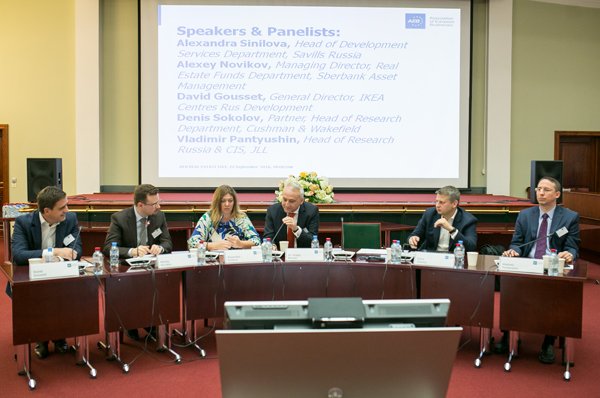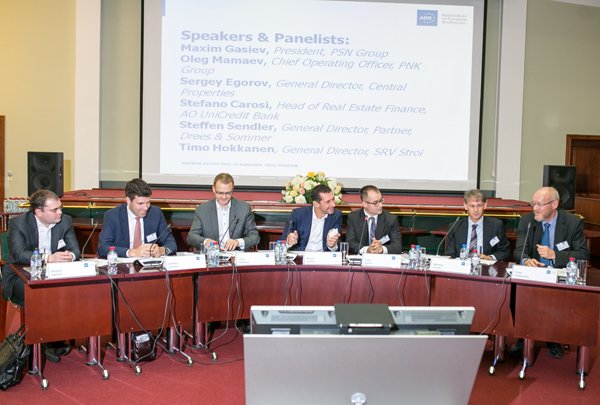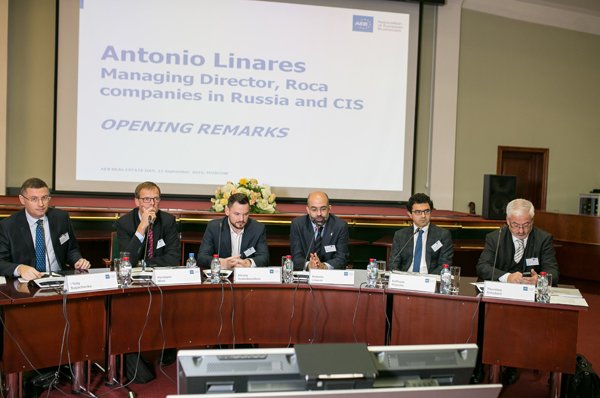News
AEB Real Estate Day 2016
22.09.2016

It was opened by Ruslan Kokarev, AEB COO, and Filippo Baldisserotto, Member of the AEB Board, Chairman of the AEB Real Estate Committee. They welcomed all the participants and invited them to attend the conference next year. The conference was moderated by: 1st session – Dr. Holger Mueller, Managing Director of the Real Estate Department, PwC; 2nd session – Tomi Asanti, Head of Representative office, Sponda Russia; 3rd session – Antonio Linares, Managing Director, Roca in Russia and the CIS.
1st session:
The discussion of the first panel “Never miss a good crisis” – how to benefit from the current state of the real estate market”, moderated by Dr. Holger Mueller, Managing Director of the Real Estate Department, PwC, focused mainly on how to make the best of the current situation on the Russian property market. The participants agreed that the market has reached the bottom and in some areas – such as office space – will reach it soon. Different opinions arose on how long the current situation will continue. While the majority assumes that we are in a "new normal", in which business activity as a whole will be subdued, some participants predicted an upswing in the near future, in particular in the residential sector. All the participants agreed that the time of easy money was gone for good and that in the years to come success on the market depends increasingly on the quality of projects.

L–R: David Gousset, General Director, IKEA Centres Rus Development; Alexey Novikov, Managing Director, Real Estate Funds Department, Sberbank Asset Management; Alexandra Sinilova, Head of Development Services Department, Savills Russia; Dr. Holger Mueller, Managing Director of the Real Estate Department, PwC ; Denis Sokolov, Partner, Head of Research Department, Cushman & Wakefield; Vladimir Pantyushin, Head of Research Russia & CIS, JLL.
2nd session:
Tomi Asanti, Head of the Finnish property investment company Sponda, moderated the 2nd panel on opportunities for construction companies and developers in the Russian real estate market. The panelists noted that the residential segment is currently clearly more attractive as an investment than the development of commercial properties such as offices and shopping centers. The biggest problem for commercial real estate development is that the rents that tenants are willing to pay have dropped significantly. So, future cash flows will not necessarily cover development costs and risks. The panel also noted that due to the higher risks and lower visibility in the Russian regions, development opportunities are far better in and around Moscow, than far away from the Russian capital. A positive outcome of the discussion was that it appears we have already hit the bottom of the current real estate circle, and so, the market currently provides interesting opportunities for companies committed to the Russian market in the mid- to long term.

L–R: Sergey Egorov, General Director, Central Properties; Steffen Sendler, General Director, Partner, Drees & Sommer; Oleg Mamaev, Chief Operating Officer, PNK Group; Maxim Gasiev, President, PSN Group; Tomi Asanti, Head of the Representative Office, Sponda Russia; Stefano Carosi, Head of Real Estate Finance, AO UniCredit Bank; Timo Hokkanen, General Director, SRV Stroi.
3rd session:
The 3rd session of Real Estate Day, "Russian Regions: are they ready to catch up?", moderated by Antonio Linares, Managing Director, Roca in Russia and the CIS, saw a lively discussion on the main drivers for growth in the regions. Vitaly Bogachenko from Saint Gobain explained that in Russia there is a modest 25 m2 of residential space per person compared to 45 m2 in Western Europe. In the regions, this space per person may be even lower, which gives a clear view of the potential for growth in the real estate sector, in Russia as a whole and in the regions in particular. The continuous growth of Moscow was also raised, and in comparison, the difficulties to retain people in the regions. If this is not compensated for by state policy, the situation could reach a grotesque level in which the whole country is abandoned and the entire population is concentrated around Moscow. Thorsten Schubert, from Knauf, and Hermann Wies, from Bosch, confirmed that it is not easy to retain professionals in the regions since growth in Moscow does not seem to be slowing, making it a city where it is becoming ever more difficult to spend time efficiently. Alexey Voskoboinikov from Siemens presented the Republic of Tatarstan and the city and region of Voronezh as two examples of places where citizens were engaged, well-educated and where there were policies to attract the populace to stay in the region. There was a consensus that the lack of labour mobility, to and between regions, creates barriers for the further growth of investments since it is difficult to attract employees from other regions due to, among other reasons, the lack of affordable real estate. Raffaele Mascolo, from Kerama Marazzi, talked about the difficulties of investing in the regions and concluded that if there were no policies made to make the regions attractive, this would only make it harder. In conclusion, the panelists agreed that if measures are not taken, Moscow can be at the same time a driver of growth and a limitation for the healthy distribution of the growth across Russia. In the end, if Moscow wants to be a city of services, there needs to be someone to whom the city can offer those services.

L–R: Vitaly Bogachenko, Chairman of the AEB Construction Industry & Building Material Suppliers Committee, Corporate Affairs Director, Saint-Gobain; Hermann Wies, Vice President of Financial Affairs, Robert Bosch; Alexey Voskoboynikov, Head of Siemens Real Estate, Siemens Russia and CIS; Antonio Linares, Managing Director, Roca in Russia and the CIS; Raffaele Mascolo, Real Estate Director, Kerama Marazzi; Thorsten Schubert, CFO, Knauf Group CIS.
We kindly thank our sponsors for their invaluable contribution:
| Gold sponsor
|
 |
| Silver sponsor
|
The event presentations are available HERE.
For more photos please visit our Facebook page.



 Get it on
Get it on Download on the
Download on the